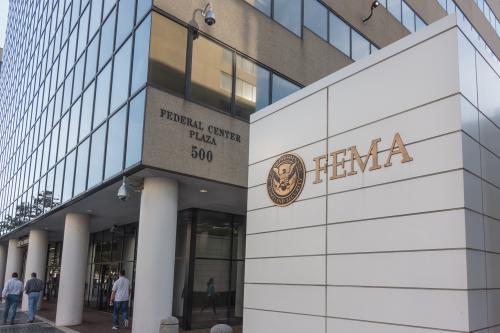I am absolutely delighted to be standing here 40 years after my first day as CBO Director, celebrating a strong, vibrant, respected institution that serves the Congress well. I am grateful to my friend Doug Elmendorf, the extraordinarily able and skillful current Director of CBO, for marking the occasion in such a festive way. I am looking forward to discussing challenges that CBO will meet in the future with my long-time friend Bob Sunshine and the awesome and congenial group of people who have headed CBO over four decades. What could be better than that?
Forty years ago today I was sworn in by Speaker of the House Carl Albert. The President pro tem of the Senate was Democratic Senator Jim Eastland of Mississippi, which gives a clue that it was a different era. There was a luncheon after the ceremony, and then Bob Reischauer and I went back to the single office we shared in the Dirksen Building—the original location of the CBO–and started figuring out how to get the new institution up and running. There wasn’t a lot of language in the Budget Act about the CBO and almost no legislative history—nothing about the size or organization of the CBO. We were hiring people to help us get started, drawing organization charts, and writing job descriptions all at the same time and making up the rules of the game as we started playing it. We were energized, but a bit overwhelmed.
Objectively, the CBO looked pretty fragile. When the Budget Act passed in 1974, the Budget Committees plunged into the new process and hired staff. But my appointment was delayed by a dispute between the House and the Senate, who had chosen different candidates for Director. I was the Senate’s choice. This impasse lasted for months and was finally resolved by a bizarre incident involving a powerful committee chairman and exotic dancer named Fanne Foxe. That incident ended the career of Wilbur Mills, but by a quirk of fate opened the opportunity for a House/Senate compromise that led to my appointment. So I owed my job to Fanne Foxe.
By Feb. 24, 1974, the Budget Committees had staffed up with budget analysts, some of whom wondered if they couldn’t do the job the CBO was supposed to do. There were a lot of powerful people on the Hill, who were not convinced that a new Hill agency was needed. Plenty of skeptics would not have given much for our chances of surviving 40 months, let alone 40 years. The press was particularly doubtful that a nonpartisan, analytical agency could fit into the intensely partisan political atmosphere of Congress, and some of them did their best to trip us up.
So why did we survive? Phil Joyce has written a book about the CBO, as well as a more recent Brookings paper in which he talks about some of the reasons.
He talks about strong leadership at the beginning—I like that one a lot—and about the series of able serious, policy wonks that have led the institution over the years.
He talks about dedication to non-partisan analysis and some of the decisions that reinforced that commitment. I think he is right about the retrospective importance of the decision I made early on that CBO should not make recommendations. It should give the best estimates it can of costs and effects of legislation; it should present options and alternatives, but never tell the Congress what to do. I and my successors defended that stance time after time for 40 years and it paid off.
Phil talks about the excellent, highly qualified, hard-working CBO staff and its tradition of doing everything possible to get the numbers right —even when it meant working late into the night and getting yelled at by some pretty rude characters.
He talks about the bipartisan support we got from the Budget Committees, who protected our efforts to hire strong staff without regard to political affiliation and make the best estimates we could without fear of partisan retaliation. Chairman Ed Muskie and Ranking Member Henry Bellmon gave us particularly strong bipartisan cover in the Senate.
He gives examples of CBO analyses that distressed political leaders because it did not support their agendas—our early analyses of Pres. Carter’s energy plan and Pres. Reagan’s budget, and Bob Reischauer’s costing of the Clinton health plan. Another example, among many, is June O’Neill standing up to the advocates of Fannie Mae.
These points are important and contributed to CBO success, but by themselves they did not guarantee that CBO would survive for 40 years and earn its current status.
Does anyone remember the Office Technology Assessment? OTA was started shortly before the CBO with the mission of providing Congress with analyses of scientific and technology issues. It was headed by an able physicist named Jack Gibbons; had highly qualified, hard-working staff; it produced interesting reports that were widely read; and had bipartisan support. But the OTA isn’t here anymore—not celebrating an anniversary. It is a shame—Congress could use objective scientific advice at the moment.
I believe CBO survived because Congress needs it so badly. It needs an independent nonpartisan agency to make budget estimates and do analysis of budget alternatives. This need in turn stems from two sources:
One is the Constitution itself with its separation of powers and allocation of the power of the purse to the Congress (subject to presidential veto). Budgeting is an existential power of Congress, essential to its role under the Constitution. Science policy, for better or worse, is not.
The other is the extraordinary importance of both long and short run fiscal policy to the health of the U.S. economy and our status as a world power. This importance has grown over the 40 years.
Let me say a word about each.
Given how clear the Constitution is about crucial role of the legislative branch in decisions about spending and taxing, it is surprising the Congress allowed its power to erode as much as it had by 1974. At that time, the president pretty much called shots on budget priorities and fiscal issues. The executive branch had centralized its power to make budget proposals in White House. OMB and the agencies controlled budget information—they produced the estimates and forecasts. There were multiple power centers on the Hill—in the Appropriations Committees and subcommittees and tax-writing committees–but they had narrow jurisdictions. Congress did not have a process for making decisions on the budget as a whole, setting spending priorities, or voting on fiscal policy. They didn’t have an agency working for them that they could ask to analyze the executive’s proposals or provide independent estimates of what they would cost and what effects they would have. They relied on the executive branch, but were often suspicious of what they were told. This on-going tension between legislative and executive branches often trumped party affiliation and boiled over when Pres. Nixon impounded funds—that is, he refused to spend appropriated funds. The Budget and Impoundment Act of 1974 that created CBO grew out of that confrontation.
The intervening decades have strengthened Congress’ power over budget decisions and underlined the importance of budget projections, estimates and analysis. It is hard to imagine Congress now without its own budget office. I doubt there is support in either house or either party for going back to the old reliance on the executive branch for budget estimates.
And the federal budget itself has changed since 1974. Annual appropriations, especially after the recent round of cuts, are far less important–the lowest in relation to the size of the economy in decades. Entitlements—especially Medicare, Medicaid, and Social Security—are far more important, as is spending through the tax code. Debt has become much larger and more important in decisions about spending and taxing. Debt held by the public is now more than double the percent of GDP it was before the Great Recession and more than three times what it was in 1974 (23 percent compared with 74 percent). I don’t care what Paul Krugman says, that’s nervous-making.
These budget facts make estimates of the future impact of today’s spending and taxing decisions far more important to policy makers than they were 40 or even 10 years ago. It makes it essential that Congress have a strong, nonpartisan agency doing the best it can in the face of great economic uncertainty and partisan polarization to give Congress and the public its best effort to estimate what budget actions will cost and what their consequences will be.
I look forward to the panel discussion with Bob Sunshine and my colleagues.



Commentary
40th Anniversary of the Congressional Budget Office
March 2, 2015